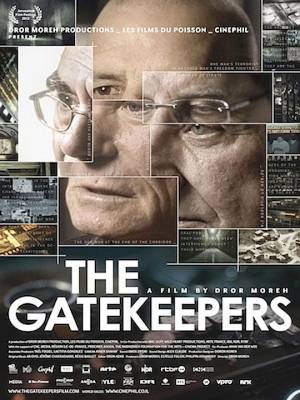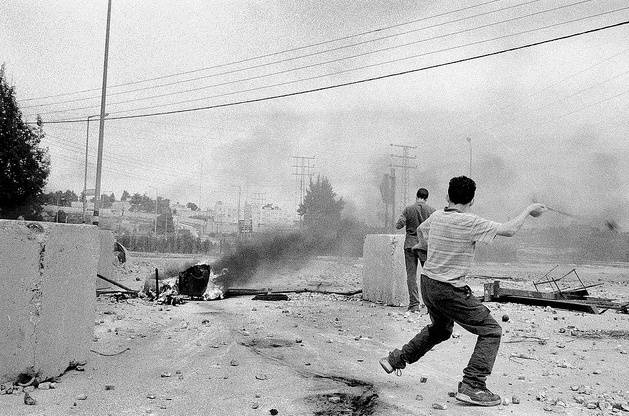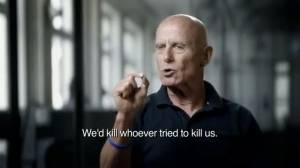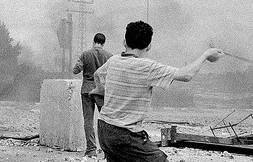A few months back, I gave a favorable review to the controversial Academy Award nominated film, Zero Dark Thirty, a film that drew criticism from both Hollywood and major political players for its depiction of torture as a means to an end in the search for, and subsequent execution of, Osama Bin Laden. The film’s opening sequences showed the seasoning of a CIA operative, portrayed to perfection by Jessica Chastain, as she forces herself to observe, and later participates in, the torture of a political prisoner. The torture is graphic, and Chastain shows the conflict between the character’s human revulsion and her sense of duty. Ultimately, the film asserts that the operative needs to turn off her compassion and humanity to get the job done. It is a disturbing and uncomfortable observation of the cost to our country’s collective humanity in the war on terror.
 I was reminded of this film’s unflinching point-of-view while watching Dror Moreh’s 2012 documentary, The Gatekeepers, currently playing at The Art Theater Co-op. The documentary focuses on the actions of Shin Bet, an Israeli secret service branch and elite squad in charge of covert operations, apprehensions, and executions of both Palestinian and Jewish terrorists in Israel’s war on terror. This elite organization is sworn to secrecy, and their identities are carefully guarded throughout their tenure with the organization. Members of the Shin Bet have not, until the making of this documentary, spoken publically of their purpose or methods. In the film, Moreh interviews six former heads of the organization, and the interviews are interspersed with graphic and disturbing surveillance footage of successful attacks on known terrorists. The grainy, black-and-white footage and the calm and matter-of-fact narrative of the former Shin Bet members takes the audience on a journey where duty to country is paramount and the cost of human life is merely a mission statistic.
I was reminded of this film’s unflinching point-of-view while watching Dror Moreh’s 2012 documentary, The Gatekeepers, currently playing at The Art Theater Co-op. The documentary focuses on the actions of Shin Bet, an Israeli secret service branch and elite squad in charge of covert operations, apprehensions, and executions of both Palestinian and Jewish terrorists in Israel’s war on terror. This elite organization is sworn to secrecy, and their identities are carefully guarded throughout their tenure with the organization. Members of the Shin Bet have not, until the making of this documentary, spoken publically of their purpose or methods. In the film, Moreh interviews six former heads of the organization, and the interviews are interspersed with graphic and disturbing surveillance footage of successful attacks on known terrorists. The grainy, black-and-white footage and the calm and matter-of-fact narrative of the former Shin Bet members takes the audience on a journey where duty to country is paramount and the cost of human life is merely a mission statistic.
Through the subtitled interviews we note the operatives’ detailing the efficiency of their methods, the minimization of their casualties, and the good of their greater mission to protect Israel with a lack of passion that mirrors many civilian discussions of what a day at the office is like. These operatives’ office is a world strewn with victims young and old, first from terrorist acts and then as retribution in an effort to end the terrorists’ goals and weaken their resolve. A small child covered in shrapnel wounds, an elderly man with amputated limbs, a near nude woman hovering near death as she is pulled from the street, and bodies covered with bloody white sheets are the landscape of their country, and the operatives recounting how they exact revenge is equally grim. Buses and vehicles explode or are crushed by tanks, pedestrians are vaporized in a city block’s bombing and vanish as the blast’s fireball subsides, and the operatives congratulate themselves on minimizing civilian casualties and their efficient kills of enemies of the state.

In the first moments of the piece, one operative states, “Forget about morality,” and extols the merit of the final objectives of the movement. For more than an hour, these operatives seem almost robotic in their resolve. Theirs is a struggle that has gone on far longer than the American war of terror, and their enemies are legion. While we have experienced significant acts of terrorism on our home soil, these operatives have grown up in a country at constant risk of mass destruction and upheaval. It is a state we hopefully will never be able to relate to fully, but a state that changes its citizenry and government operatives forever. As the film progresses, spouses and family concerns come into play, and the operatives, one by one, decide to retire from service to resume a normal life. This is no easy task, and the aging operatives are seen as carefree children in haunting photo montages as they question their mission and its cost. Eventually, they acknowledge the futility of their efforts, pointing out a Palestinian prisoner’s assertion that, “The goal of terrorism is to create suffering, to change the lives of the enemy, to alter their ways of life permanently.”
Several internet descriptions of this film discuss the operatives calling for a dual state compromise to end the madness. As I watched the proceedings, I noted the interviewees’ sadness about how this job had changed them, and some fleeting  moments of their acknowledgement of the aforementioned need to compromise. Ultimately, this dark, disturbing documentary shows how one’s humanity cannot be fully recovered after it’s sacrificed, and illustrates the personal cost of reaching that point of no return in the passionless and hypnotic recounting of its subjects. The journey is fascinating and educational, but the hope for the future is muted by the distant images of extermination and the horror of ignoring your humanity for the greater good.
moments of their acknowledgement of the aforementioned need to compromise. Ultimately, this dark, disturbing documentary shows how one’s humanity cannot be fully recovered after it’s sacrificed, and illustrates the personal cost of reaching that point of no return in the passionless and hypnotic recounting of its subjects. The journey is fascinating and educational, but the hope for the future is muted by the distant images of extermination and the horror of ignoring your humanity for the greater good.
As a night raid decimates a family’s peaceful sleep, one subject notes the sadness of separating a family while we watch a targeted man beg for his life and the lives of his family. Another operative recounts the dispatching of a terrorist mastermind with a booby-trapped cell phone, as a digital image of the young man taking a call shows his method of execution. A quick cut to the real victim’s body, head held together with bloody bandages, eyes wide in a dead stare as his remains are paraded down the streets in a make-shift coffin is more stomach-churning than editorializing, and the purpose of these haunting images is lost in the muted horror of their depiction. Sometimes using only your subjects’ words makes your point so obscure that it drowns in the deadened images of this film. There is a fascination with the proceedings, but the point is blunted and the audience is left to wonder if that’s all there is.
The Gatekeepers continues for another week at the Art.








